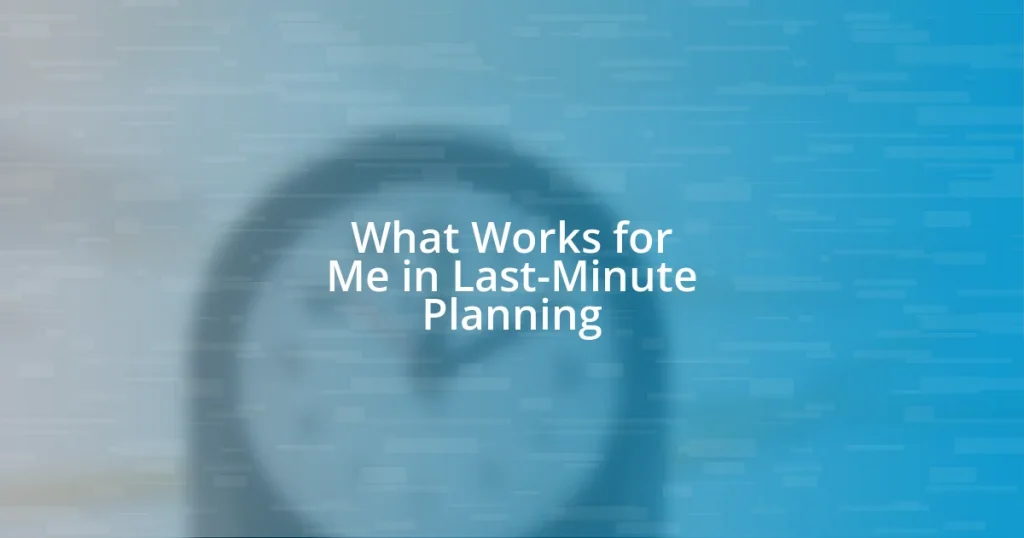Key takeaways:
- Last-minute planning can enhance creativity and adaptability, leading to memorable experiences despite initial stress.
- Key strategies for effective quick planning include prioritization, delegation, simplifying decisions, and utilizing time management tools.
- Reflecting on successes and failures fosters growth, enabling better planning and execution in future high-pressure situations.
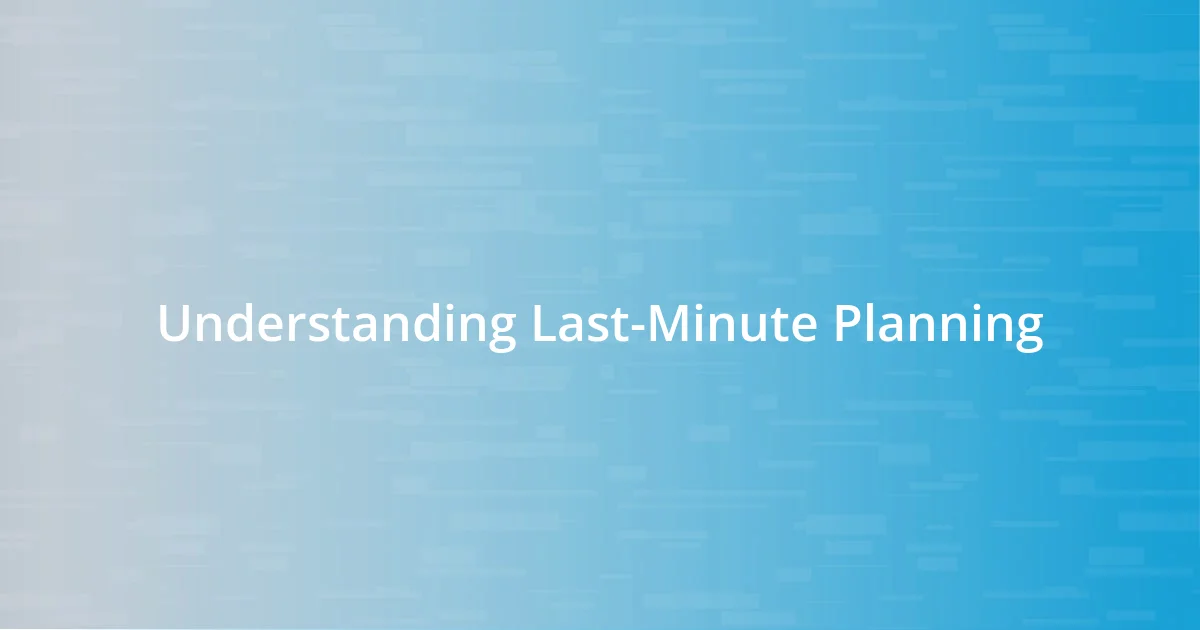
Understanding Last-Minute Planning
Last-minute planning often has a bad rap, but I’ve found it can actually foster creativity and quick problem-solving. Have you ever experienced that heart-racing rush when you pull together an event at the eleventh hour? Those moments can lead to some of the most memorable experiences, although they definitely come with a fair share of stress!
When I think back to my own last-minute endeavors, I remember one unforgettable birthday party I organized after a scheduling mix-up. With just a few hours to spare, I rallied my friends to whip up decorations and food—a last-minute potluck that turned into an evening full of laughter and unexpected surprises. Isn’t it fascinating how spontaneity sometimes leads to the best outcomes?
Approaching last-minute planning with a flexible mindset can make all the difference. Instead of focusing on the chaos, I learned to prioritize what truly mattered in those situations—a gathering of loved ones, or simply a fun experience, rather than an impeccably executed plan. How about you? Have you ever embraced the unpredictability and emerged with a sense of accomplishment?
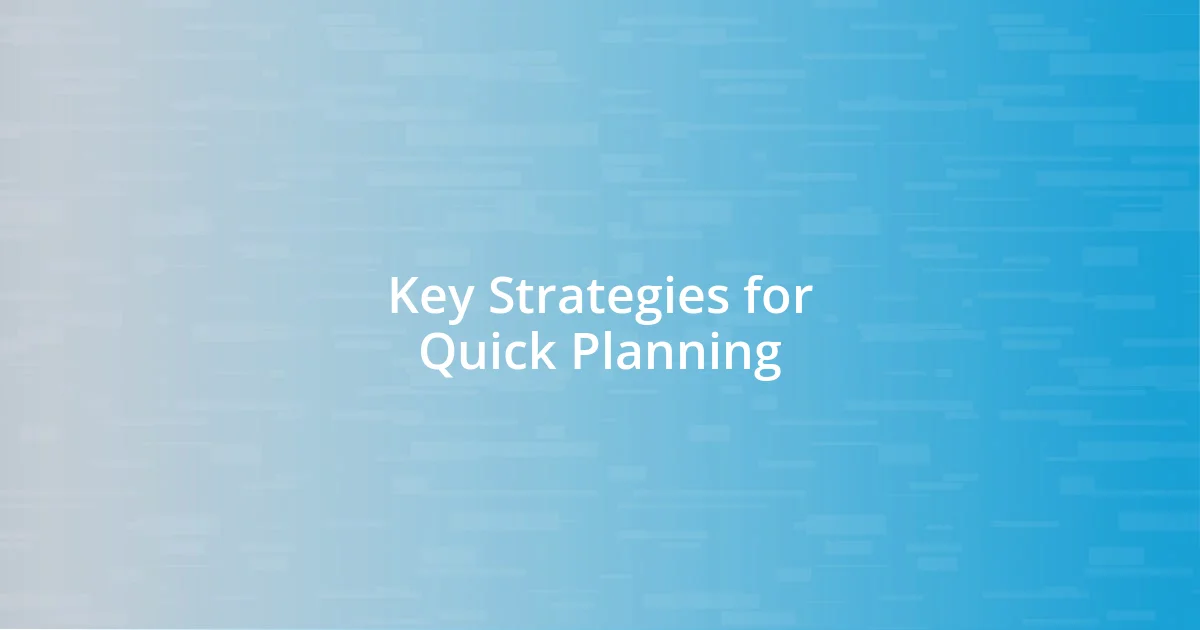
Key Strategies for Quick Planning
When it comes to quick planning, I’ve discovered that prioritization is crucial. In moments of urgency, I ask myself, “What’s essential?” This mindset can dramatically reduce overwhelm and help me focus on the core elements that truly matter. For example, during a last-minute family gathering, I chose to focus on food and good company instead of elaborate decorations.
Here are some strategies that work wonders for me:
- Establish Clear Goals: Identify what you want to achieve. A quick mental checklist helps streamline your efforts.
- Delegate Tasks: Don’t hesitate to enlist help. I often find that friends and family are more than willing to pitch in.
- Simplify Decisions: I avoid overthinking by choosing the simplest options available—like opting for finger foods instead of a full meal.
- Set a Timer: Limiting time for each task keeps me focused and efficient. I find that when the clock is ticking, my creativity sparks!
Using these strategies consistently, I’ve turned what could be stressful situations into opportunities for bonding and joy with those around me.
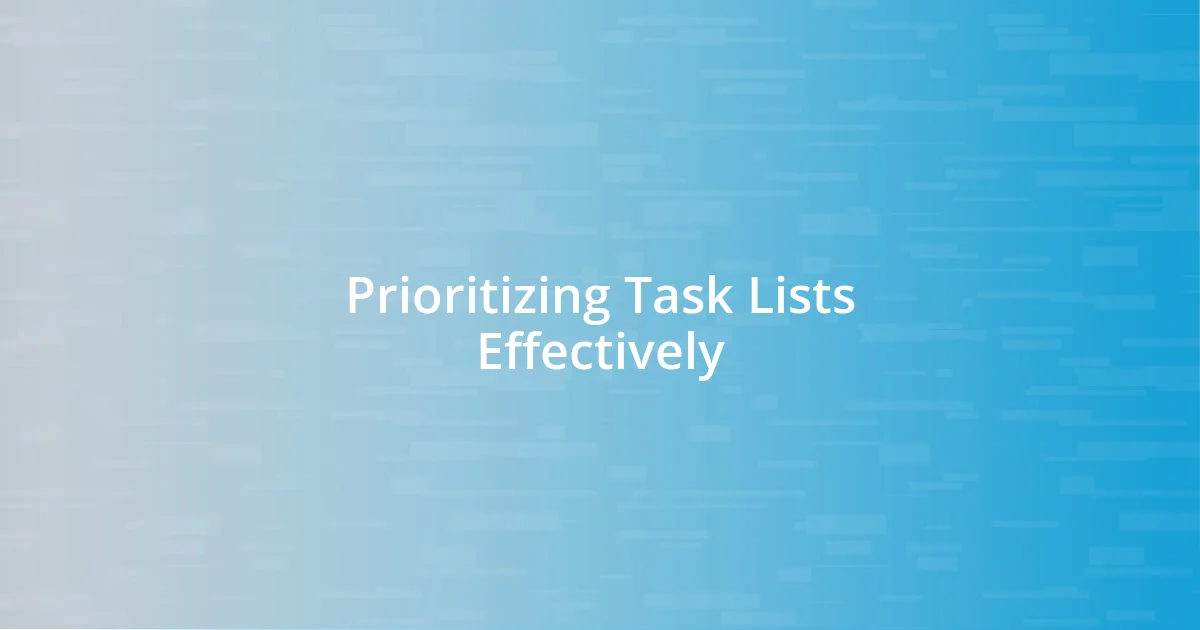
Prioritizing Task Lists Effectively
When I’m faced with creating a task list at the last minute, I prioritize by categorizing tasks into urgent and important. This process helps me quickly distinguish what needs my immediate attention versus what can wait. For instance, I once had to organize a community event just days before it took place. I started by listing what could cause delays—like securing a venue and reaching out to vendors—while letting less critical details slide for the moment. This not only clarified my focus but reduced my stress level significantly, allowing me to act confidently and efficiently.
To prioritize effectively, I turn to deadlines. I jot down tasks paired with their respective timeframes, which creates an urgency that compels action. During one chaotic week, a surprise visit from an old friend coincided with a work project deadline. By identifying which tasks needed immediate attention and which could wait until after my friend’s arrival, I managed to enjoy my time with them without sacrificing work responsibilities. Balancing the two took effort, but the joy of friendship alongside deadlines made every moment rewarding.
| Task Importance | Task Urgency |
|---|---|
| High Priority (Urgent & Important) | Address immediately |
| High Priority (Important but Not Urgent) | Schedule for later |
| Low Priority (Urgent but Not Important) | Delegate or delay |
| Low Priority (Not Urgent & Not Important) | Kick to future planning |
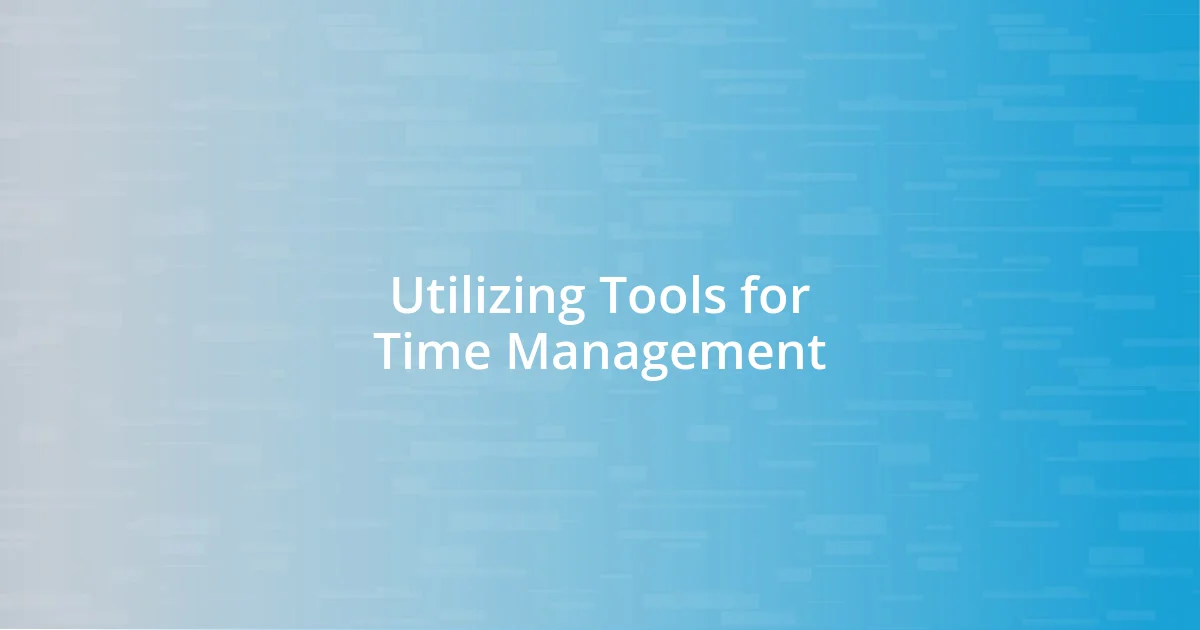
Utilizing Tools for Time Management
Utilizing various tools for time management has become a game changer for me, especially when I’m in a pinch. I often rely on digital apps that allow me to quickly jot down thoughts or make checklists. For instance, I once used a simple note-taking app to organize my thoughts for a surprise party. The ability to create and modify lists instantly helped me adapt as new ideas struck, and it really made the planning feel less chaotic.
In my experience, project management tools are fantastic lifelines in last-minute scenarios. When I was tasked with coordinating a last-minute team meeting, I turned to an online scheduling tool to find a common availability among my teammates. It was a relief to see everyone’s schedules lined up with just a few clicks instead of the back-and-forth of emails. Can you imagine how much time I saved? This just reaffirmed my belief that incorporating technology can streamline even the most frantic of situations.
I’ve also found that using timers can inject a sense of urgency while keeping the process enjoyable. Recently, I set a 30-minute timer to tackle my chores before a guest arrived. Each time the timer chimed, I felt a rush of motivation to beat the clock. I found myself racing against time and, oddly enough, I turned this mundane task into a mini-challenge that made my heart race with excitement. How many of us can say we’ve made cleaning feel like a game?

Setting Realistic Goals and Deadlines
Setting realistic goals and deadlines is crucial, especially when things get hectic. I’ve learned that breaking down a larger project into smaller, more manageable tasks helps maintain clarity. For example, during a last-minute presentation preparation, instead of stressing over the entire project, I set a goal of completing one slide every 20 minutes. This approach kept me focused and empowered, transforming an overwhelming task into achievable bites.
I also prioritize setting timelines that I know I can realistically meet. I remember trying to implement too many changes for a project due the next day. I quickly realized that aiming for perfection instead of completion was counterproductive. By adjusting my expectations and focusing on what was feasible, I completed the essentials without unnecessary stress. Have you ever set yourself up for failure with unrealistic deadlines? It can feel like a weight on your shoulders, but being pragmatic about what you can achieve shifts that burden.
Ultimately, it’s about understanding my own pace and recognizing that perfection isn’t always the goal. In one instance, I aimed to create a beautifully polished report overnight, but it resulted in exhaustion and frustration. Instead, I switched gears and allowed myself more time to create something solid, prioritizing clarity over aesthetics. That shift in perspective not only made the process more enjoyable but also allowed for a more meaningful outcome. Isn’t it liberating to prioritize well-being while still striving for success?
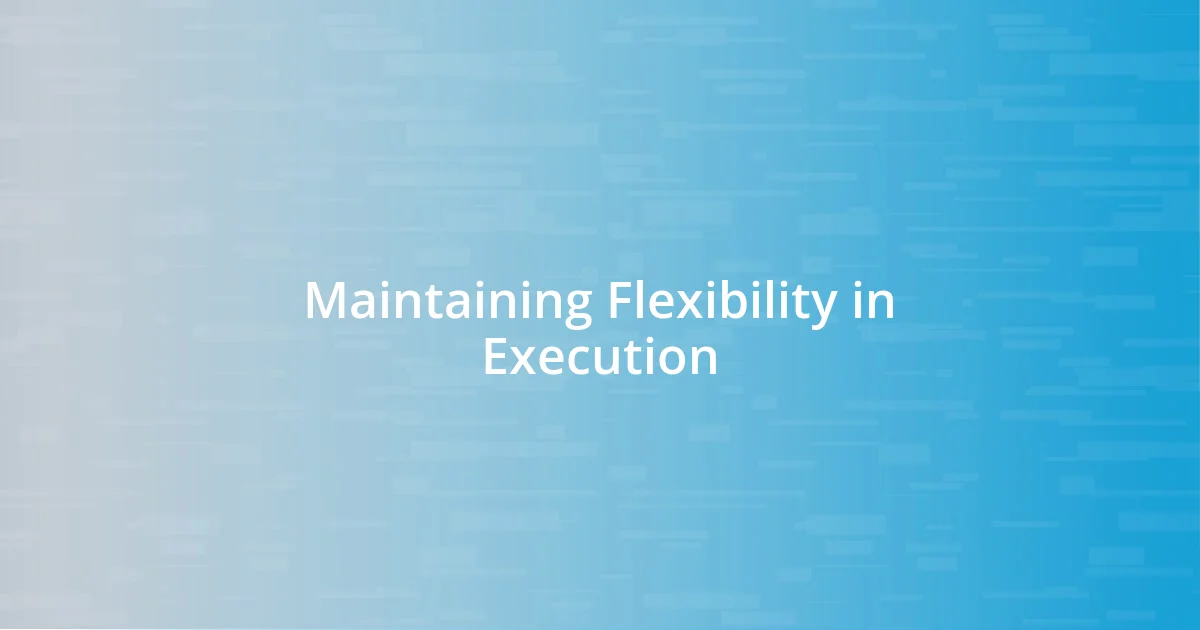
Maintaining Flexibility in Execution
Sometimes, the best plans unravel at the last minute, and that’s when maintaining flexibility becomes essential. I had a day when I was all set to host a dinner party, only to find out a key ingredient was missing an hour before my guests arrived. Instead of panicking, I quickly adjusted the menu, using what I had on hand to create a delightful replacement. With a little creativity, I turned what could have been a disaster into an opportunity for something new. Isn’t it amazing how being flexible can turn a potential setback into a surprise win?
Staying open to changes during execution can really help relieve stress. I recall a time when I was supposed to lead a workshop but found out my tech setup wasn’t compatible with the venue’s equipment. Instead of fretting, I shifted to a more interactive discussion format. This not only salvaged the situation but also encouraged more engagement from participants. They responded positively, and I came away with valuable insights that I wouldn’t have gathered otherwise. Have you ever adapted on the fly and ended up with a better outcome than you anticipated?
Another aspect of flexibility is knowing when to delegate. I used to think I had to do everything myself, but that habit quickly turned overwhelming. During a last-minute event I organized, I decided to let a friend handle the decorations. This allowed me to focus on guest interactions, and the atmosphere turned out much warmer and more inviting than I could have achieved alone. Seeing friends step up really highlighted the value of trust and collaboration. How often do we forget that sharing responsibilities can lead to even better results?
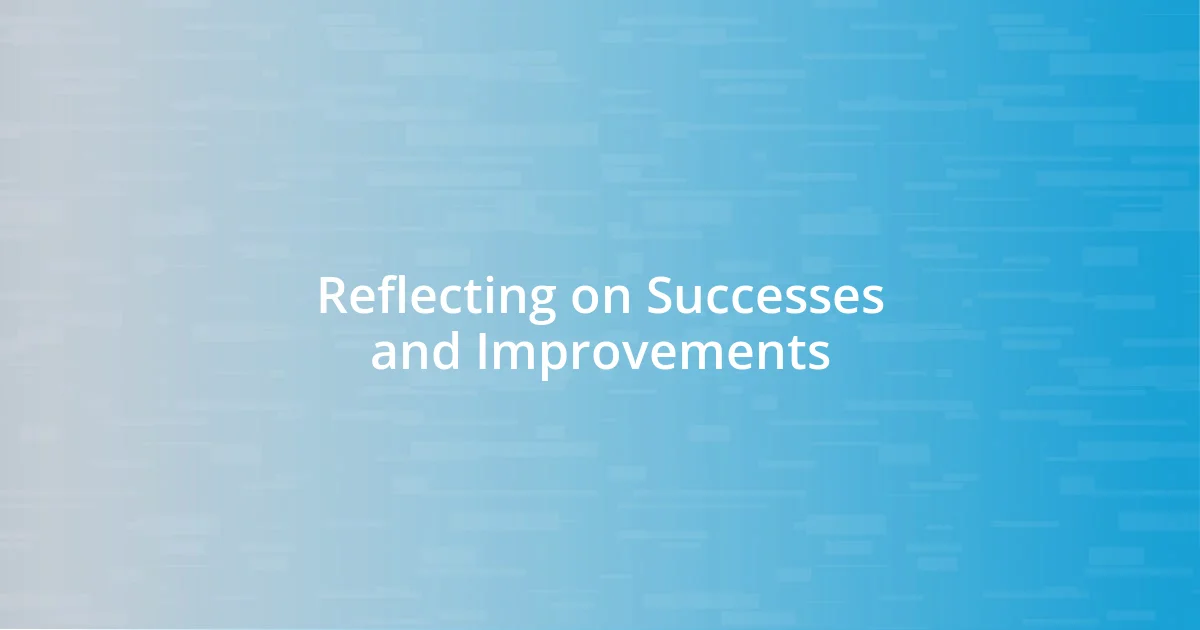
Reflecting on Successes and Improvements
Reflecting on my successes and areas for improvement is a practice that has transformed how I approach last-minute planning. Recently, I kicked off a project with a vision board, showcasing my ideas and goals. It was a powerful visual reminder of what I aimed to accomplish, and when I reviewed it at the end, I felt a sense of pride seeing how far I’d come. It’s fascinating how a little reflection can reveal not just achievements but also the small shifts in strategy that made those successes possible, don’t you think?
On the flip side, I’ve also had moments where I fell short, but those experiences turned out to be the most enlightening. Once, during an impromptu team meeting, I noticed that my presentation was lacking direction, leading to confusion among the team. Instead of glossing over it, I took time afterward to analyze what went wrong. I recognized that poor preparation had knocked my confidence. Embracing that mistake led me to establish a more structured approach for future meetings, where clarity became my focal point. How often do we shy away from confronting our shortcomings when they might actually guide our growth?
Every experience, whether a triumph or a lesson learned, serves as a stepping stone to improvement. I vividly recall the exhilaration of completing a last-minute project on a tight deadline, yet I also remember the nagging sense of overwhelm that lingered afterwards. By taking a moment to assess what worked in that frantic situation—like prioritizing communication with my team and redistributing tasks—I vowed to carry those insights into future projects. It’s empowering to realize that each challenge paves the way for becoming more adept and resilient. Have you had similar moments that have pushed you to refine your approach?











